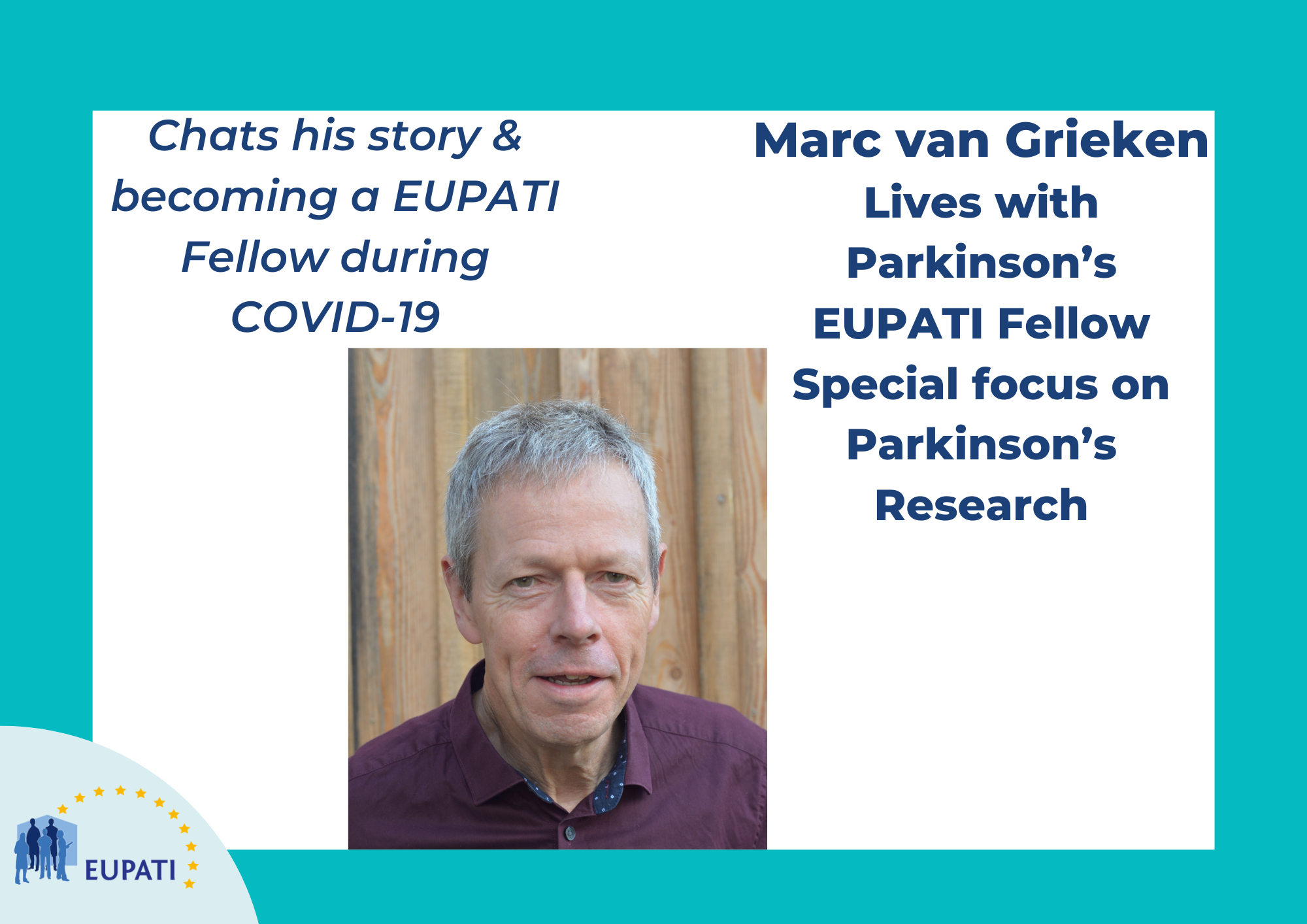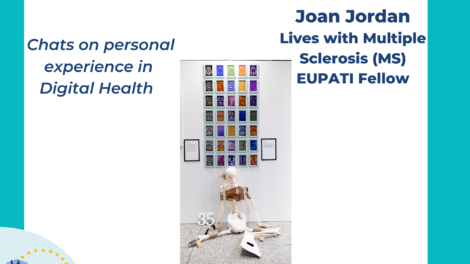
Marc van Grieken received his Parkinson’s diagnosis in 2006. While it took some time to come to terms with this progressive condition, the path to patient advocacy first revealed itself when marking a milestone birthday. Around the same time Marc became involved in the Dundee Research Interest Group (DRIG) established by Parkinson’s UK which further fuelled his interest in in patient involvement.
Marc was part of Cohort 4, studying and graduating as a EUPATI Fellow during the depths of COVID-19. This cohort went through the entire Patient Expert Training Programme online, never meeting face-to-face. We chatted to Marc about his story and what it was really like training during the pandemic.
Could you share your story with us?
In 2003 I ran the New York Marathon and in the following year kept on running partly in training for another marathon. However initially occasionally but then more regularly, my right leg appeared to ‘stop working‘. There is no easy way to describe what that feels like, it literally is like pulling the plug out of the socket that provides the power to an electric fan. (The signal from my brain to the muscles of my right leg had been cut off ).
After several visits to my doctor, and a visit to a physiotherapist I was referred to a neurologist who after about 5 to 10 minutes being in his office announced: I think I know what you’ve got, I think you have idiopathic Parkinson’s. What do you think of that? I didn’t know what to think, I did not know what Parkinson’s disease was let alone Idiopathic Parkinson’s disease. Several weeks later I received a copy of his letter back to my GP which stated that I presented a ‘fascinating history’ followed by his diagnosis.
I didn’t know what he thought was fascinating, it certainly wasn’t fascinating to me. I did not know what to think, what to do, what this would mean for my family and how this would affect all of us. I struggled with accepting this diagnosis and perhaps like many others largely denied the onslaught of Parkinson’s disease. Looking back, I now know that I had become depressed and acted like a rabbit caught in headlights.
I think my response to receiving the Parkinson’s diagnosis is fairly common: we are scared of what lies ahead of us. We worry about how we will be seen by the outside world by our colleagues and family and friends. What will define us? How we will be perceived? This fear may lead us to become increasingly singular and withdrawn from our environment.
It took me a long time, slowly, very slowly over a period of perhaps 10 years or so, coming to terms with Parkinson’s disease which, we know of course, is a relentlessly progressive condition. It will not stop, there is no cure, at best symptoms can be managed improving our quality of life.
So, when I was approaching my 60th birthday having been diagnosed 11 years previously, I finally decided to do something more positive and announced that I wanted to raise money for Parkinson’s research during my 60th year, setting a target of £1,000 for every year or £60,000. Most people around me, quietly, never outspoken to me, thought I would never manage that. But we were all wrong. The support from family and close friends and friends in the community where I live, colleagues et cetera et cetera all contributed either by organising events to raise money or by donating money. Having started the year in January 2017, I finished the year in January 2018 having raised a total of some £76,000 which went to Parkinson’s UK research funding.
That year also reawakened the campaigner in me, and this was stimulated by Parkinson’s UK through the establishment of the Dundee Research Interest Group, and the many contacts I made during the fundraising year. As long as I can, I will continue speaking up for all people with Parkinson’s raising awareness, demanding more research funding ultimately leading towards finding a cure.
How did you hear about the EUPATI Patient Expert Training Programme?
I was alerted to the EUPATI programme by Parkinson’s UK. I think this probably was because I had taken on the role of chair of the Dundee Research Interest Group (DRIG) and had expressed some interest in further patient involvement and engagement.
What were your expectations of this training?
I did not really know what to expect but had spoken with someone who had gone through the training as part of cohort 3. I was attracted by the concept and the fact that it would lead to meeting many people from all over Europe.
As part of Cohort 4 you completed this training during COVID-19 – what was that experience like?
The COVID 19 experience and effect on the training programme of our cohort was strange I would say. Working on your own required motivation, and bags of time. I had the latter but because of the exceptionally unfamiliar COVID ‘climate’ and the total unfamiliarity with the subject area and acronyms made it quite challenging. As a consequence, I lost pace and was way behind programme looking towards the 1st in-person but not in person online event. I remember calling or emailing Ingrid Heyne to say that I probably would not make it by the deadline. Ingrid responded by gently suggesting to not beat myself up but to try and carry on and if necessary EUPATI could grant me 1 or 2 weeks of extension time.
I suddenly realised that this course, this programme would be exceptionally valuable to anybody completing the training and therefore if I just gave up I effectively had deprived someone else from taking the programme because I was sponsored by Parkinson’s UK. (I think so anyway) supported by Ingrid therefore I made it into the ‘in-person’ but actually not in person event and this is where many pennies positively dropped. A large group of wonderful individuals, with whom, despite never meeting in person, I already experienced a kind of togetherness. Similarly, the solidarity between the tutors and the trainees was tremendous.
I was very disappointed not to be able to meet anybody from our cohort during our study year but nevertheless had already formed some strong relationships with others. When invited to join the 10 year of EUPATI celebration in Brussels, this made meeting some of you (know who) finally and for the 1st time exceptionally touching and inspirational and powerful.
So yes, there were some extra challenges to doing this during the pandemic year but because it was also slightly more unstructured as a consequence of the pandemic, exemplified for example by the fact that I was way behind and then eventually caught up. This gave some greater flexibility and that I think was beneficial.
Did you receive additional support from the EUPATI Secretariat during your training and if so, how did this help you?
Yes, Ingrid Heyne was exceptionally supportive and she inspired me to continue and I will always be grateful to her for that.
How did you feel about your cohort despite never meeting in-person?
I think that the fact that we could not meet in person as a cohort does not necessarily mean fewer or less strong ties have been developed between individuals. I certainly feel a strong bond with several Cohort 4 Fellows. (It’s the special bit the 4’s has and no one else will ever get, perhaps a unique solidarity).
How has this training translated into your current work?
Now that’s an interesting question how does the training translate into my current work? Firstly, that depends on which current work you refer to. Is it my work as a landscape architect running a small practice or is my work as a patient advocate, patient expert or a patient representative? The answer is it has a very substantial influence on both. On my work as a landscape architect, it has the effect of taking time away increasing the constant need for more juggling. For my work as a consequence of being a EUPATI Fellow the training has been invaluable. Without it I would never have got into it. I also note that the slightest bit of increase of activity related to patient representation and engagement et cetera will in due course leads to a little more and a little more and a little more more etc.
What would you advise people who would like to take the training?
I would say: Go for it. Have an open mind. By all means dislike learning 200 acronyms (rest assured once graduated there are hundreds more), meet wonderful people, enjoy and remember you are in it for a reason: to speak up for those who can’t, campaign for just and fair access to medication and treatments across the world, to promote research, to educate and inform others and improve people’s quality of life.
Date posted: February 29, 2024
Categories: Testimonials



